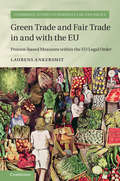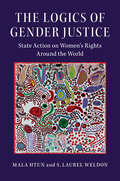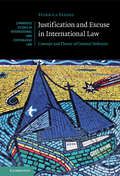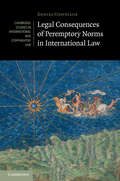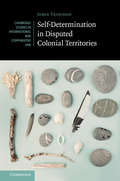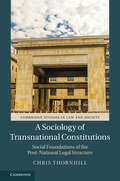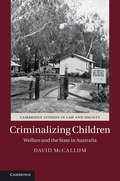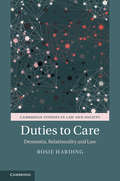- Table View
- List View
Cambridge Studies in European Law and Policy: Process-based Measures within the EU Legal Order (Cambridge Studies in European Law and Policy)
by Laurens AnkersmitThis book explores how EU law constrains the freedom of the EU, the Member States, and private bodies to adopt measures that seek to protect social and environmental interests abroad by placing conditions on production processes in other states. The permissibility of such process-based measures has been examined primarily within the World Trade Organization (WTO) context, but the challenges that they present are equally for the EU internal market system. Ankersmit identifies three core challenges posed by process-based measures from an EU law perspective: extraterritoriality, unilateralism and the competitive and democratic problems created by private rule-making. It examines these issues in the context of free movement, competition, public procurement, and EU tax law. This book will appeal to academics, policy makers and practitioners interested in trade and environment, the social impact of trade law, and European and international market regulation.
Cambridge Studies in European Law and Policy: The Governance of EU Fundamental Rights
by Mark DawsonIn spite of a continued increase in the substantive scope and reach of EU fundamental rights, little attention has been paid to their practical enforcement. In this book, Mark Dawson looks at the mechanisms through which EU fundamental rights are protected and enforced, closely examining the interrelation between the EU's pertinent legal and political bodies. He argues that in order to understand EU fundamental rights we must also understand the institutional, political and normative constraints that shape the EU's policies. The book examines the performance of different EU institutions in relation to rights and studies two important policy fields - social rights and rule of law protection - in depth.
Cambridge Studies in European Law and Policy: The International Responsibility of the European Union
by Casteleiro Andrés DelgadoWhen is the EU responsible under international law? Is the EU a 'special case' international organisation? The UN General Assembly's adoption of the ILC articles on the International Responsibility of International Organisations was only the catalyst for debate on this topic. In this book, the author examines the legal personality of the EU, how - if at all - its responsibility under international agreements is shared between Member States, and how the international responsibility of the EU relates to its internal responsibilities under EU law. By exploring how in practice such legal regimes as the ILC, UNCLOS, and the WTO have held the EU responsible, this book provides an innovative analysis of a fundamental aspect of the relationship between the EU and international law.
Cambridge Studies in Gender and Politics: State Action on Women's Rights Around the World (Cambridge Studies in Gender and Politics)
by Mala Htun S. Laurel WeldonWhen and why do governments promote women's rights? Through comparative analysis of state action in seventy countries from 1975 to 2005, this book shows how different women's rights issues involve different histories, trigger different conflicts, and activate different sets of protagonists. Change on violence against women and workplace equality involves a logic of status politics: feminist movements leverage international norms to contest women's subordination. Family law, abortion, and contraception, which challenge the historical claim of religious groups to regulate kinship and reproduction, conform to a logic of doctrinal politics, which turns on relations between religious groups and the state. Publicly-paid parental leave and child care follow a logic of class politics, in which the strength of Left parties and overall economic conditions are more salient. The book reveals the multiple and complex pathways to gender justice, illuminating the opportunities and obstacles to social change for policymakers, advocates, and others seeking to advance women's rights.
Cambridge Studies in International and Comparative Law: Climate Change Litigation
by Hari M. Osofsky Jacqueline Peel Peel, Jacqueline and Osofsky, Hari M.This examination of the role of litigation in addressing the problem of climate change focuses not only on how the massive and growing number of lawsuits influences regulation directly, but also on how the lawsuits shape corporate behaviour and public opinion. It provides readers with an understanding of how these lawsuits have shaped approaches to mitigation and adaptation, and have been used to try to force and to block regulation. There is a particular emphasis on lawsuits in the United States and Australia, the two jurisdictions which have had the most climate change litigation in the world, and the lessons provide broader insights into the role of courts in addressing climate change.
Cambridge Studies in International and Comparative Law: Concept and Theory of General Defences (Cambridge Studies in International and Comparative Law #130)
by Paddeu FedericaThe defences available to an agent accused of wrongdoing can be considered as justifications (which render acts lawful) or excuses (which shield the agent from the legal consequences of the wrongful act). This distinction is familiar to many domestic legal systems, and tracks analogous notions in moral philosophy and ordinary language. Nevertheless, it remains contested in some domestic jurisdictions where it is often argued that the distinction is purely theoretical and has no consequences in practice. In international law too the distinction has been fraught with controversy, though there are increasing calls for its recognition. This book is the first to comprehensively and thoroughly examine the distinction and its relevance to the international legal order. Combining an analysis of State practice, historical, doctrinal and theoretical developments, the book shows that the distinction is not only possible in international law but that it is also one that would have important practical implications.
Cambridge Studies in International and Comparative Law: Exclusion from Public Space
by Daniel MoeckliHardly known twenty years ago, exclusion from public space has today become a standard tool of state intervention. Every year, tens of thousands of homeless individuals, drug addicts, teenagers, protesters and others are banned from parts of public space. The rise of exclusion measures is characteristic of two broader developments that have profoundly transformed public space in recent years: the privatisation of public space, and its increased control in the 'security society'. Despite the fundamental problems it raises, exclusion from public space has received hardly any attention from legal scholars. This book addresses this gap and comprehensively explores the implications that this new form of intervention has for the constitutional essentials of liberal democracy: the rule of law, fundamental rights, and democracy. To do so, it analyses legal developments in three liberal democracies that have been at the forefront of promoting exclusion measures: the United Kingdom, the United States, and Switzerland.
Cambridge Studies in International and Comparative Law: Humanity at Sea
by Itamar MannThis interdisciplinary study engages law, history, and political theory in a first attempt to crystallize the lessons the global 'refugee crisis' can teach us about the nature of international law. It connects the dots between the actions of Jewish migrants to Palestine after WWII, Vietnamese 'boatpeople', Haitian refugees seeking to reach Florida, Middle Eastern migrants and refugees bound to Australia, and Syrian refugees currently crossing the Mediterranean, and then legal responses by states and international organizations to these movements. Through its account of maritime migration, the book proposes a theory of human rights modelled around an encounter between individuals in which one of the parties is at great risk. It weaves together primary sources, insights from the work of twentieth-century thinkers such as Hannah Arendt and Emmanuel Levinas, and other legal materials to form a rich account of an issue of increasing global concern.
Cambridge Studies in International and Comparative Law: International Law and Governance of Natural Resources in Conflict and Post-Conflict Situations
by Dam-de Jong, DaniëllaNatural resource wealth is conducive to a country's development. Nevertheless, the last few decades have shown a harsher reality, where natural resources have also triggered, financed or fuelled a number of internal armed conflicts. Examples include the armed conflicts in Cambodia, Sierra Leone, Liberia and the Democratic Republic of the Congo, which have been financed with the exploitation of a variety of valuable natural resources, including diamonds, gold, timber, oil and cocoa. The aim of this book is to assess the contribution of international law in ensuring that natural resources are used to promote development and to achieve sustainable peace instead of financing armed conflict. For this purpose, the author discusses the international legal framework for the governance of natural resources in States in general, in situations of armed conflict and as part of conflict resolution and post-conflict peacebuilding efforts.
Cambridge Studies in International and Comparative Law: Legal Consequences of Peremptory Norms in International Law (Cambridge Studies in International and Comparative Law #132)
by Daniel CostelloeWhen is a norm peremptory? This is a question that has troubled legal scholars throughout the development of modern international law. In this work, Daniel Costelloe suggests - through an examination of State practice and international materials - that it is the legal consequences of a norm which distinguish it as peremptory. This book sheds new light on the legal consequences that peremptory norms have, for instance, in the law of treaties, international responsibility and state immunity. Unlike their substance or identification, the consequences of peremptory norms have remained under-studied. This book is the first specifically on this topic and is essential reading for all scholars and practitioners of public international law.
Cambridge Studies in International and Comparative Law: Religious Hatred and International Law
by Jeroen TempermanThe UN International Covenant on Civil and Political Rights obliges state parties to prohibit any advocacy of religious hatred that constitutes incitement to discrimination or violence. This book traces the origins of this provision and proposes an actus reus for this offence. The question of whether hateful incitement is a prohibition per se or also encapsulates a fundamental 'right to be protected against incitement' is extensively debated. Also addressed is the question of how to judge incitement. Is mens rea required to convict someone of advocating hatred, and if so, for what degree of intent? This analysis also includes the paramount question if and to what extent content and/or context factors ought to be decisive. The author extensively engages with comparative domestic law and compares the workings of the UN Human Rights Committee with those of the UN Committee on the Elimination of Racial Discrimination and the European Court of Human Rights.
Cambridge Studies in International and Comparative Law: Self-Determination in Disputed Colonial Territories (Cambridge Studies in International and Comparative Law #134)
by Jamie TrinidadSelf-Determination in Disputed Colonial Territories addresses the relationship between self-determination and territorial integrity in some of the most difficult decolonization cases in international law. It investigates historical cases, such as Hong Kong and the French and Portuguese territories in India, as well as cases that remain very much alive today, such as the Western Sahara, Gibraltar, the Falkland Islands and the Chagos Islands. This book provides a comprehensive analysis of colonial territories that are, or have been, the subject of adverse third-party claims, invariably by their neighbouring states. Self-Determination in Disputed Colonial Territories takes a contextual, historical approach to mapping the existing law and will be of interest to international lawyers, as well as scholars of international relations and students of the history of decolonization.
Cambridge Studies in International and Comparative Law: Taking Economic, Social and Cultural Rights Seriously in International Criminal Law
by Evelyne SchmidIs the neglect of economic, social and cultural abuses in international criminal law a problem of positive international law or the result of choices made by lawyers involved in mechanisms such as criminal prosecutions or truth commissions? Evelyne Schmid explores this question via an assessment of the relationship between violations of economic, social and cultural rights and international crimes. Based on a thorough examination of the elements of international crimes, she demonstrates how a situation can simultaneously be described as a violation of economic, social and cultural rights and as an international crime. Against the background of the emerging debates on selectivity in international criminal law and the role of socio-economic and cultural abuses in transitional justice, she argues that international crimes overlapping with violations of economic, social and cultural rights deserve to be taken seriously, for much the same reasons as other international crimes.
Cambridge Studies in International and Comparative Law: The Doctrine of Odious Debt in International Law
by Jeff KingAccording to the doctrine of odious debt, loans which are knowingly provided to subjugate or defraud the population of a debtor state are not legally binding against that state under international law. Breaking with widespread scepticism, this groundbreaking book reaffirms the original doctrine through a meticulous and definitive examination of state practice and legal history. It restates the doctrine by introducing a new classification of odious debts and defines 'odiousness' by reference to the current, much more determinate and litigated framework of existing public international law. Acknowledging that much of sovereign debt is now governed by the private law of New York and England, Jeff King explores how 'odious debts' in international law should also be regarded as contrary to public policy in private law. This book is essential reading for practising lawyers, scholars, and development and human rights workers.
Cambridge Studies in International and Comparative Law: The Formation and Identification of Rules of Customary International Law in International Investment Law
by Patrick DumberryRules of customary international law provide basic legal protections to foreign investors doing business abroad. These rules remain of fundamental importance today despite the growing number of investment treaties containing substantive investment protection. In this book, Patrick Dumberry provides a comprehensive analysis of the phenomenon of custom in the field of international investment law. He analyses two fundamental questions: how customary rules are created in this field and how they can be identified. The book examines the types of manifestation of State practice which should be considered as relevant evidence for the formation of customary rules, and to what extent they are different from those existing under general international law. The book also analyses the concept of States' opinio juris in investment arbitration. Offering guidance to actors called upon to apply customary rules in concrete cases, this book will be of significant importance to those involved in investment arbitration.
Cambridge Studies in Islamic Civilization: Sexual Violation in Islamic Law
by Hina AzamThis book provides a detailed analysis of Islamic juristic writings on the topic of rape and argues that classical Islamic jurisprudence contained nuanced, substantially divergent doctrines of sexual violation as a punishable crime. The work centers on legal discourses of the first six centuries of Islam, the period during which these discourses reached their classical forms, and chronicles the juristic conflict over whether or not to provide monetary compensation to victims. Along with tracing the emergence and development of this conflict over time, Hina Azam explains evidentiary ramifications of each of the two competing positions, which are examined through debates between the Ḥanafī and Mālikī schools of law. This study examines several critical themes in Islamic law, such as the relationship between sexuality and property, the tension between divine rights and personal rights in sex crimes, and justifications of victim's rights afforded by the two competing doctrines.
Cambridge Studies in Islamic Civilization: The Economics of Ottoman Justice
by Metin Coşgel Boğaç ErgeneDuring the seventeenth and eighteenth centuries, the Ottoman Empire endured long periods of warfare, facing intense financial pressures and new international mercantile and monetary trends. The Empire also experienced major political-administrative restructuring and socioeconomic transformations. In the context of this tumultuous change, The Economics of Ottoman Justice examines Ottoman legal practices and the sharia court's operations to reflect on the judicial system and provincial relationships. Metin Coşgel and Boğa#65533; Ergene provide a systematic depiction of socio-legal interactions, identifying how different social, economic, gender and religious groups used the court, how they settled their disputes, and which factors contributed to their success at trial. Using an economic approach, Coşgel and Ergene offer rare insights into the role of power differences in judicial interactions, and into the reproduction of communal hierarchies in court, and demonstrate how court use patterns changed over time.
Cambridge Studies in Law And Society: Criminal Defense in China
by Halliday Sida Liu Terence C.Criminal Defense in China studies empirically the everyday work and political mobilization of defense lawyers in China. It builds upon 329 interviews across China, and other social science methods, to investigate and analyze the interweaving of politics and practice in five segments of the practicing criminal defense bar in China from 2005 to 2015. This book is the first to examine everyday criminal defense work in China as a political project. The authors engage extensive scholarship on lawyers and political liberalism across the world, from seventeenth-century Europe to late twentieth-century Korea and Taiwan, drawing on theoretical propositions from this body of theory to examine the strategies and constraints of lawyer mobilization in China. The book brings a fresh perspective through its focus on everyday work and ordinary lawyering in an authoritarian context and raises searching questions about law and lawyers, politics and society, in China's uncertain future.
Cambridge Studies in Law and Society: A Sociology of Transnational Constitutions (Cambridge Studies In Law And Society Ser.)
by Chris ThornhillThis volume focuses on the rise of transnational constitutional laws, primarily created by the interaction between national and international courts and by the domestic transformation of international law. Through detailed analysis of patterns of institutional formation at key historical junctures in a number of national societies, it examines the social processes that have locked national states into an increasingly transnational constitutional order, and it explains how the growth of global constitutional norms has provided a stabilizing framework for the functions of state institutions. The book adopts a distinctive historical-sociological approach to these questions, examining the deep continuities between national constitutional law and contemporary models of global law. The volume makes an important contribution to the sociology of constitutional law, to the sociology of post-national legal processes, and to the sociology of human rights law. This title is also available as Open Access.
Cambridge Studies in Law and Society: Buried in the Heart
by Erin BainesIn Buried in the Heart, Erin Baines explores the political agency of women abducted as children by the Lord's Resistance Army in northern Uganda, forced to marry its commanders, and to bear their children. Introducing the concept of complex victimhood, she argues that abducted women were not passive victims, but navigated complex social and political worlds that were life inside the violent armed group. Exploring the life stories of thirty women, Baines considers the possibilities of storytelling to reclaim one's sense of self and relations to others, and to generate political judgement after mass violence. Buried in the Heart moves beyond victim and perpetrator frameworks prevalent in the field of transitional justice, shifting the attention to stories of living through mass violence and the possibilities of remaking communities after it. The book contributes to an overlooked aspect of international justice: women's political agency during wartime.
Cambridge Studies in Law and Society: China and Islam
by Matthew S. ErieChina and Islam examines the intersection of two critical issues of the contemporary world: Islamic revival and an assertive China, questioning the assumption that Islamic law is incompatible with state law. It finds that both Hui and the Party-State invoke, interpret, and make arguments based on Islamic law, a minjian (unofficial) law in China, to pursue their respective visions of 'the good'. Based on fieldwork in Linxia, 'China's Little Mecca', this study follows Hui clerics, youthful translators on the 'New Silk Road', female educators who reform traditional madrasas, and Party cadres as they reconcile Islamic and socialist laws in the course of the everyday. The first study of Islamic law in China and one of the first ethnographic accounts of law in postsocialist China, China and Islam unsettles unidimensional perceptions of extremist Islam and authoritarian China through Hui minjian practices of law.
Cambridge Studies in Law and Society: Contesting Immigration Policy in Court
by Leila KawarWhat difference does law make in immigration policymaking? Since the 1970s, networks of progressive attorneys in both the US and France have attempted to use litigation to assert rights for non-citizens. Yet judicial engagement - while numerically voluminous - remains doctrinally curtailed. This study offers new insights into the constitutive role of law in immigration policymaking by focusing on the legal frames, narratives, and performances forged through action in court. Challenging the conventional wisdom that 'cause litigation' has little long-term impact on policymaking unless it produces broad rights-protective principles, this book shows that legal contestation can have important radiating effects on policy by reshaping how political actors approach immigration issues. Based on extensive fieldwork in the United States and France, this book explores the paths by which litigation has effected policy change in two paradigmatically different national contexts.
Cambridge Studies in Law and Society: Contractual Knowledge
by Grégoire Mallard Jérôme SgardContractual Knowledge: One Hundred Years of Legal Experimentation in Global Markets, edited by Grégoire Mallard and Jérôme Sgard, extends the scholarship of law and globalization in two important directions. First, it provides a unique genealogy of global economic governance by explaining the transition from English law to one where global exchanges are primarily governed by international, multilateral, and finally, transnational legal orders. Second, rather than focusing on macro-political organizations, like the League of Nations or the International Monetary Fund, the book examines elements of contracts, including how and by whom they were designed and exactly who (experts, courts, arbitrators, and international organizations) interpreted, upheld, and established the legal validity of these contracts. By exploring such micro-level aspects of market exchanges, this collection unveils the contractual knowledge that led to the globalization of markets over the last century.
Cambridge Studies in Law and Society: Criminalizing Children
by David McCallumIncarceration of children is rising rapidly throughout of Australia, with indigenous children most at risk of imprisonment. Indigenous and non-indigenous children have been subject to detention in both welfare and justice systems in Australian states and territories since colonization. Countless governments and human rights enquiries have attempted to address the problem of the increasing criminalization of children, with little success. David McCallum traces the history of 'problem children' over several decades, demonstrating that the categories of neglected and offending children are both linked to similar kinds of governing. Institutions and encampments have historically played a significant role in contributing to the social problems of today. This book also takes a theoretical perspective, tracking parallel developments within the human sciences of childhood and theories of race. Applying a social theoretical analysis of these events and the changing rationalities of governing, McCallum challenges our assumptions about how law and governance of children leads to their criminalization and incarceration.
Cambridge Studies in Law and Society: Dementia, Relationality and Law (Cambridge Studies in Law and Society)
by Rosie HardingThe world of dementia care can be a difficult one for carers to navigate, posing new challenges at every stage from diagnosis to end of life. In her ground-breaking investigation, rooted in original empirical data, Rosie Harding explores the regulatory and legal dimensions of caring for a person with dementia. By exploring carers' experiences of dementia care, she critiques the limitations of current approaches to health and social care regulation. This socio-legal work is a new contribution to the study of feminist care ethics, relationality, and vulnerability theory. Duties to Care argues that by understanding the relational contexts that shape everyday experiences of regulatory structures, we will better understand where law is operating to support carers, and where it adds to the difficulties they experience. Ultimately, the challenges that dementia poses will be addressed only if we find solutions that take account of the relationality of life, dementia, and law.
